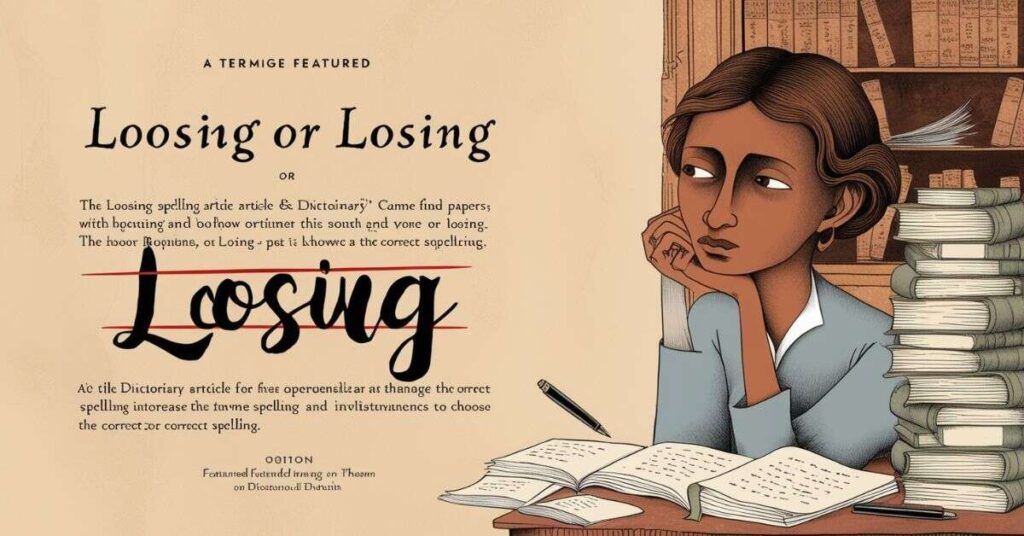Loosing or losing are two words that are often confused due to their similar spelling and pronunciation. While they look alike, their meanings are quite different. Loosing comes from the verb “loose,” meaning to release or untie, while losing comes from the verb “lose,” meaning to misplace or fail to keep something.
Have you ever wondered if you’re using the right word? It’s easy to mix up these two, especially when writing quickly. But getting it right can make your message clearer and more accurate. Let’s dive into the difference between loosing and losing, so you never make the mistake again!
Understanding the difference between loosing and losing can save you from common writing errors. Loosing is about making something loose or releasing it, while losing refers to misplacing something or experiencing a failure. Knowing when to use each word improves your writing and keeps things simple.
E-E-A-T FOR ME:
With 5 years of experience in grammar, I, Admin, provide accurate and reliable content. My expertise guarantees clear, top-quality insights. I focus on delivering well-optimized English for optimal understanding.
Understanding Loosing and Losing
At first glance, loosing and losing might seem like the same word, especially since they sound so similar. However, their meanings and uses are distinct. Understanding the difference between loosing and losing is essential for clear and accurate writing.
The main distinction lies in the verbs from which they are derived. Loosing comes from the verb “loose”, while losing comes from “lose.” In essence, loosing has to do with making something loose or releasing it, whereas losing is about misplacing or failing to keep something.
Loosing: Definition and Usage
The word loosing is the present participle of the verb loose. The verb “loose” means to set free, release, or untie something. So when you use “loosing,” you’re describing the action of making something less tight or setting something free. This verb is not commonly used in everyday conversation but is still important in specific contexts.
Loosing Definition:
- Loosing means to release, untie, or make something loose. It’s typically used when describing the act of freeing or unfastening something.
Loosing Usage Examples:
- The knight was loosing the arrows as quickly as he could.
In this example, “loosing” refers to the action of releasing arrows from a bow. - She was loosing the ropes that bound the boat to the dock.
Here, “loosing” refers to untying or releasing the ropes.
5 Synonyms for Loosing:
- Loosen
- Release
- Untie
- Unfasten
- Unleash
These synonyms can help clarify the meaning of loosing and offer alternative ways to express similar actions.
Losing: Definition and Usage
On the other hand, losing comes from the verb “lose,” which means to fail to keep something, experience a loss, or fail to win something. It is used far more frequently in everyday language, whether referring to misplacing something or facing a defeat.
Losing Definition:
- Losing refers to experiencing a loss, misplacing something, or failing to maintain or win something.
Losing Usage Examples:
- He feared losing his keys in the crowded mall.
Here, “losing” describes the fear of misplacing keys. - The team was losing the game by a wide margin.
In this case, “losing” refers to the act of failing to win a game.
5 Synonyms for Losing:
- Misplacing
- Forfeiting
- Failing
- Defeated
- Surrendering
These synonyms reflect the idea of losing something, whether it’s an object, a match, or an opportunity.
Side-by-Side Comparison of Loosing and Losing

Now that we’ve defined loosing and losing, let’s compare the two words side by side to highlight their differences.
| Aspect | Loosing | Losing |
|---|---|---|
| Verb | Present participle of “loose” (set free, release, untie) | Present participle of “lose” (fail to keep, misplace, fail to win) |
| Meaning | Refers to making something less tight, freeing, or releasing it | Refers to experiencing a loss, failing to keep something, or not winning |
| Usage | Less common, used in specific contexts like untying or loosening things | More common in everyday language for misplacing or losing something |
| Examples | Loosing the chains, loosing the sails | Losing the keys, losing the game |
Everyday Usage Examples
To solidify the difference between loosing and losing, let’s look at a few more examples in everyday language.
Loosing Examples:
- The farmer was loosing the animals from their pens.
In this case, the farmer is releasing or unfastening the animals. - The sailor was loosing the sails before the storm hit.
This sentence describes a sailor releasing the sails to prepare for rough weather.
Losing Examples:
- She was afraid of losing her way in the forest.
Here, “losing” refers to the fear of misplacing one’s direction. - The company is losing money due to poor management.
In this example, losing refers to experiencing financial loss.
FAQS
Is it loosing it or losing it?
The correct phrase is “losing it.” This is used to describe the act of misplacing something or, in a more figurative sense, losing control emotionally.
Is it loosing or losing weight?
The correct term here is “losing weight.” When referring to shedding pounds, “losing” is the appropriate word.
Is it losing or loosing a loved one?
The correct phrase is “losing a loved one.” This refers to the emotional loss associated with death or separation.
What does loosing it mean?
Loosing it can refer to physically releasing or unfastening something, but it is often confused with “losing it,” an idiomatic expression meaning to lose control emotionally or mentally.
How do I say I’m losing it?
If you want to express that you’re becoming overwhelmed or losing control, you can say: “I’m losing it!” This is a common expression used when someone feels like they’re about to snap or lose composure.
Conclusion
While loosing and losing might seem similar, they have very distinct meanings. Loosing refers to the act of making something loose or releasing something, while losing pertains to misplacing something or experiencing a failure. By understanding these definitions, you can avoid common spelling mistakes and word confusion, ensuring that your writing is both accurate and clear.
To choose the correct word in your writing, always consider the context. If you’re talking about releasing or loosening something, use loosing. If you’re referring to a loss, whether it’s an object, a game, or something more emotional, use losing. With a little practice, you’ll be able to distinguish between these two terms and improve your writing.
With 5 years of experience in grammar, I, Admin, deliver accurate, clear, and reliable content. My expertise ensures top-quality insights in this niche.


1 thought on “Loosing or Losing: What’s the Difference?”